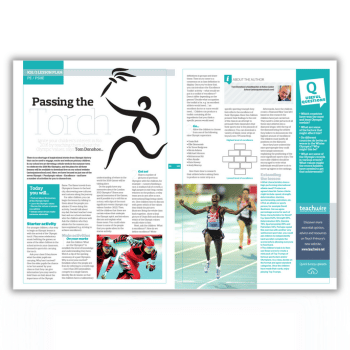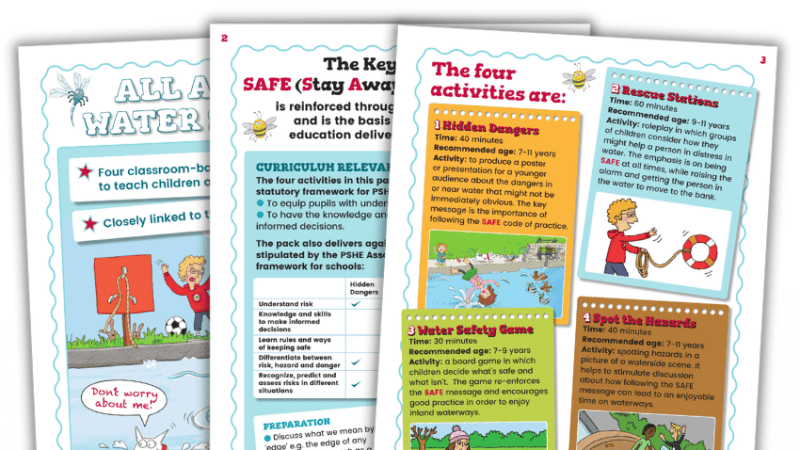Young carers – stories to support and empower children

Helen Rutter on how we can use books to ‘shine a brighter light’ into the lives of young carers, and why support at school means so much

- by Helen Rutter

The term ‘young carer’ seems relatively new to me. I’m pretty sure that when I was at school (many years ago) the term didn’t exist.
Had it existed, there is a chance that I would have been classified as one, as my mum had M.E. for most of my childhood. In my latest book – The Boy Whose Wishes Came True – a young carer is at its heart: Archie Crumb. However, I’m not sure that either myself or Archie would ever have described ourselves this way.
I wonder whether the resistance or blindness to our own situations is one of the reasons that make it hard to spot and support young people who take on caring responsibilities and roles.
If they don’t recognise that is what they are doing, then how can they reach out and get the available help? If all you have ever known is a mum who feels sad or ill a lot of the time and spends long periods in bed, or if you have an older sibling who cannot cope alone and needs your support, then that is your normality.
You don’t necessarily know to talk about it, let alone ask for help. Unless you see an alternative, how would you know that there was help available, or that you even deserved such help?
Support for young carers
I know that I never felt the need to ‘reach out’ and as me and my mum coped pretty well, I doubt there were any particular signs that my teachers would have spotted. It may well be that I would not have needed any support from anyone and that the label would not have been positive.
We coped, and I turned out alright (although when I am sobbing at my typewriter as I churn out more unprocessed emotions into a book, I do sometimes wonder). But maybe chatting to someone about my mum’s illness as a child, would have been nice – useful even. I’ll never know.
There are cases where I imagine it is crystal clear, where the state is already involved and help is offered from all available avenues. I suppose what interests me, and why I wrote it into this book, are the stories where it’s not so clear.
When it’s not obvious to the rest of the world that someone is struggling, or when a child is dealing with things only just within their capabilities. It is these cases where the lines are blurred and the cracks are just about covered up, or the façade is strong, that interest me most.
It is easy to see how in these cases teachers, friends and neighbours may not want to ‘intrude’ or ‘stick their nose in’ as things don’t look ‘too bad’ and there might be a chance they are wrong and could cause upset or offence.
When deciding if we should take action, I wonder whether our cultural propensity to politeness comes into play, or whether it is a universally tough call. I don’t know. What I do know is that it is hard.
I’ve taught kids drama for many years, and as you will know, when you ask children to express ideas through storytelling, all sorts of things come out. Knowing when a story of a little girl feeling sad and a parent shouting at them is based on a perfectly normal truth, stemming from a functional family experience, and when it is based on something darker feels incredibly difficult.
As teachers, it is tough deciding whether to follow up on something that is said, written, or even based on a feeling you have. It comes down to instincts, but are our instincts always strong enough?
I’m sure there are times when the phone call home has been unnecessary, embarrassing or potentially full of conflict, as well as times when a call that was never made would have been incredibly helpful.
What can we do in school?
There are a number of factors which may help to flag a young carer, according to UK charity Family Action (family-action.org.uk) but it is important to remember some young people may not display any of these behaviours:
- Poor and erratic attendance
- Underachievement
- Poor or missing homework
- Aggression
- Lack of cooperation or withdrawn behaviour
- Lack of parental interaction with school
- Reluctance to talk about home life.
Schools can also help support these pupils in a number of ways:
- Appointing a named member of staff as ‘young carers lead’ to implement a young carers’ policy
- Grace for lateness
- Use of office phone to call home
- Flexibility on homework deadlines
- Time for students to speak one-to-one to support worker
- Peer support groups
- Improved communication on transition to continue to support young carers from primary into secondary school
- A card that young carers can show to identify themselves, so they don’t have to repeatedly explain their circumstances.
Thinking about my younger self in relation to Archie Crumb’s story and those of so many young carers (recognised or otherwise), I think that had a teacher asked me if I was okay and if my mum was okay, yes, I may have shrugged it off and said that everything was fine.
But deep down I would have felt seen and understood. I guess that’s what recognising and labelling these things is all about. It’s about shining a brighter light into the cracks and onto those cases that might be missed; the kids that just look a bit scruffy or are always yawning; the ones who seem so much older than their years.
Our kids need to feel seen and even if their story sits just outside the line of intervention, a kind word and some extra space and time for them could make a world of difference.
I hope that The Boy Whose Wishes Came True will connect with kids who may be struggling and who are looking for the words to ask for the help that they need. Feeling represented in books and reading stories about issues that they may be experiencing will hopefully help to open up lines of communication in the classroom and at home.
The Boy Whose Wishes Came True by Helen Rutter (£6.99, Scholastic) is available in February 2022.











